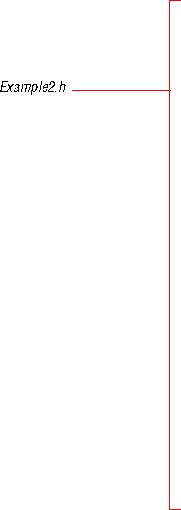Here is the owning stack as an ordinary, nonspecialized class:

// Copyright (C)1994 Taligent, Inc. All rights reserved.
// $Revision: $
#ifndef Taligent_EXAMPLE1
#define Taligent_EXAMPLE1
class TCollectibleLong;
class TOwningStackOf1
{
public:
TOwningStackOf1();
TOwningStackOf1( const TOwningStackOf1& other );
virtual ~TOwningStackOf1();
// Operator= omitted. It's like the copy constructor.
virtual void Adopt( TCollectibleLong* item );
// Orphan omitted. It's like Adopt.
virtual unsigned int Count() const;
private:
TCollectibleLong* fStack[10];
unsigned int fount;
};
#endif

// Copyright (C)1994 Taligent, Inc. All rights reserved.
// $Revision: $
#ifndef Taligent_EXAMPLE1
#include <Example1.h>
#endif
#ifndef Taligent_CLASSICDATASTRUCTURES
#include <ClassicDataStructures.h>
#endif
TOwningStackOf1::TOwningStackOf1()
: fCount(0)
{
}
TOwningStackOf1::TOwningStackOf1(
const TOwningStackOf1& other)
: fCount(other.fCount)
{
for ( unsigned int i = 0; i < fCount; i++ )
{
fStack[i] = new TCollectibleLong(*other.fStack[i]);
}
}
TOwningStackOf1::~TOwningStackOf1()
{
for ( unsigned int i = 0; i < fCount; i++ )
{
delete fStack[i];
}
}
void TOwningStackOf1::Adopt( TCollectibleLong* item )
{
fStack[fCount++] = item;
}
unsigned int TOwningStackOf1::Count() const
{
return fCount;
}

// Copyright (C)1994 Taligent, Inc. All rights reserved.
// $Revision: $
#ifndef Taligent_EXAMPLE2
#define Taligent_EXAMPLE2
#ifndef Taligent_PRIMITIVECLASSES
#include <PrimitiveClasses.h>
#endif
template <class AType>
class TOwningStackOf2
{
public:
TOwningStackOf2();
TOwningStackOf2( const TOwningStackOf2<AType>& other );
virtual ~TOwningStackOf2();
virtual void Adopt( AType* item );
virtual unsigned int Count() const;
private:
AType* fStack[10];
unsigned int fCount;
};
#ifndef Taligent_EXAMPLE2TEMPLATEIMPLEMENTATION
#include <Example2TemplateImplementation.h>
#endif
#endif

#ifndef Taligent_EXAMPLE2TEMPLATEIMPLEMENTATION
#define Taligent_EXAMPLE2TEMPLATEIMPLEMENTATION
#ifndef Taligent_EXAMPLE2
#include <Example2.h>
#endif
template<class AType>
TOwningStackOf2<AType>::TOwningStackOf2()
: fCount(0)
{
}
template<class AType>
TOwningStackOf2<AType>::TOwningStackOf2( const TOwningStackOf2<AType>& other )
: fCount(other.fCount)
{
for ( unsigned int i = 0; i < fCount; i++ )
{
fStack[i] = new AType(*other.fStack[i]);
}
}
template<class AType>
TOwningStackOf2<AType>::~TOwningStackOf2()
{
for ( unsigned int i = 0; i < fCount; i++ )
{
delete fStack[i];
}
}
template<class AType>
void TOwningStackOf2<AType>::Adopt( AType* item )
{
fStack[fCount++] = item;
}
template<class AType>
unsigned int TOwningStackOf2<AType>::Count() const
{
return fCount;
}
#endif